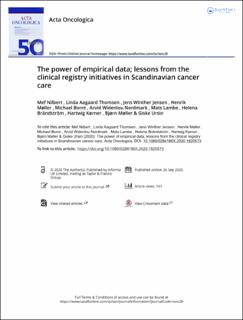| dc.contributor.author | Nilbert, Mef | |
| dc.contributor.author | Thomsen, Linda Aagaard | |
| dc.contributor.author | Winther Jensen, Jens | |
| dc.contributor.author | Møller, Henrik | |
| dc.contributor.author | Borre, Michael | |
| dc.contributor.author | Widenlou Nordmark, Arvid | |
| dc.contributor.author | Lambe, Mats | |
| dc.contributor.author | Brändström, Helena | |
| dc.contributor.author | Kørner, Hartwig | |
| dc.contributor.author | Møller, Bjørn | |
| dc.contributor.author | Ursin, Giske | |
| dc.date.accessioned | 2021-02-23T09:37:01Z | |
| dc.date.available | 2021-02-23T09:37:01Z | |
| dc.date.created | 2020-10-08T12:26:35Z | |
| dc.date.issued | 2020 | |
| dc.Published | Acta Oncologica. 2020, 1-14. | |
| dc.identifier.issn | 0284-186X | |
| dc.identifier.uri | https://hdl.handle.net/11250/2729690 | |
| dc.description.abstract | Background
In Scandinavia, there is a strong tradition for research and quality monitoring based on registry data. In Denmark, Norway and Sweden, 63 clinical registries collect data on disease characteristics, treatment and outcome of various cancer diagnoses and groups based on process-related and outcome-related variables.
Aim
We describe the cancer-related clinical registries, compare organizational structures and quality indicators and provide examples of how these registries have been used to monitor clinical performance, develop prediction models, assess outcome and provide quality benchmarks. Further, we define unmet needs such as inclusion of patient-reported outcome variables, harmonization of variables and barriers for data sharing.
Results and conclusions
The clinical registry framework provides an empirical basis for evidence-based development of high-quality and equitable cancer care. The registries can be used to follow implementation of new treatment principles and monitor patterns of care across geographical areas and patient groups. At the same time, the lessons learnt suggest that further developments and coordination are needed to utilize the full potential of the registry initiative in cancer care. | en_US |
| dc.language.iso | eng | en_US |
| dc.publisher | Taylor & Francis | en_US |
| dc.rights | Attribution-NonCommercial-NoDerivatives 4.0 Internasjonal | * |
| dc.rights.uri | http://creativecommons.org/licenses/by-nc-nd/4.0/deed.no | * |
| dc.title | The power of empirical data; lessons from the clinical registry initiatives in Scandinavian cancer care | en_US |
| dc.type | Journal article | en_US |
| dc.type | Peer reviewed | en_US |
| dc.description.version | publishedVersion | en_US |
| dc.rights.holder | Copyright 2020 The Author(s). | en_US |
| cristin.ispublished | true | |
| cristin.fulltext | original | |
| cristin.qualitycode | 1 | |
| dc.identifier.doi | 10.1080/0284186X.2020.1820573 | |
| dc.identifier.cristin | 1838189 | |
| dc.source.journal | Acta Oncologica | en_US |
| dc.identifier.citation | Acta Oncologica. 2020, 59 (11) | en_US |
| dc.source.volume | 59 | en_US |
| dc.source.issue | 11 | en_US |

